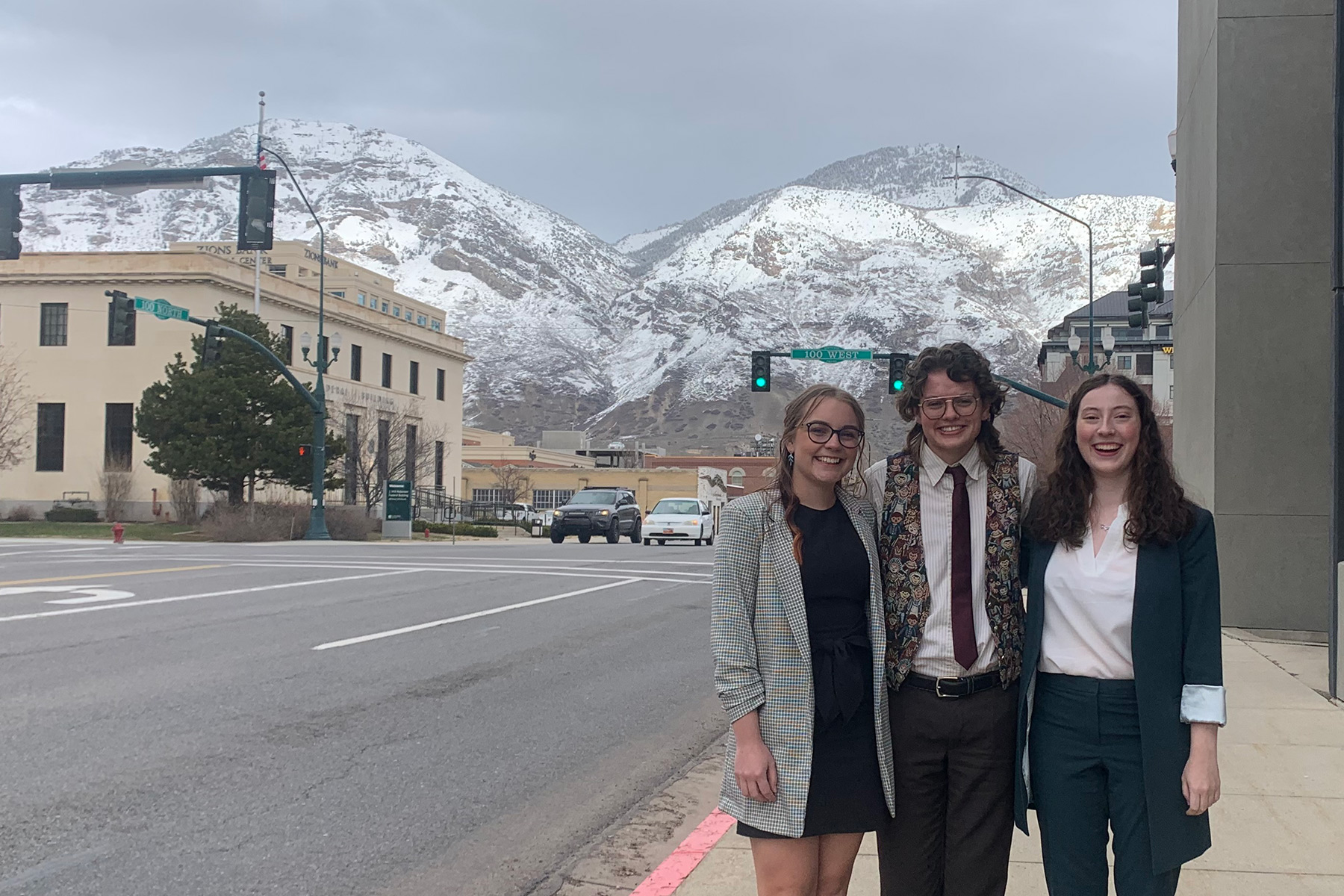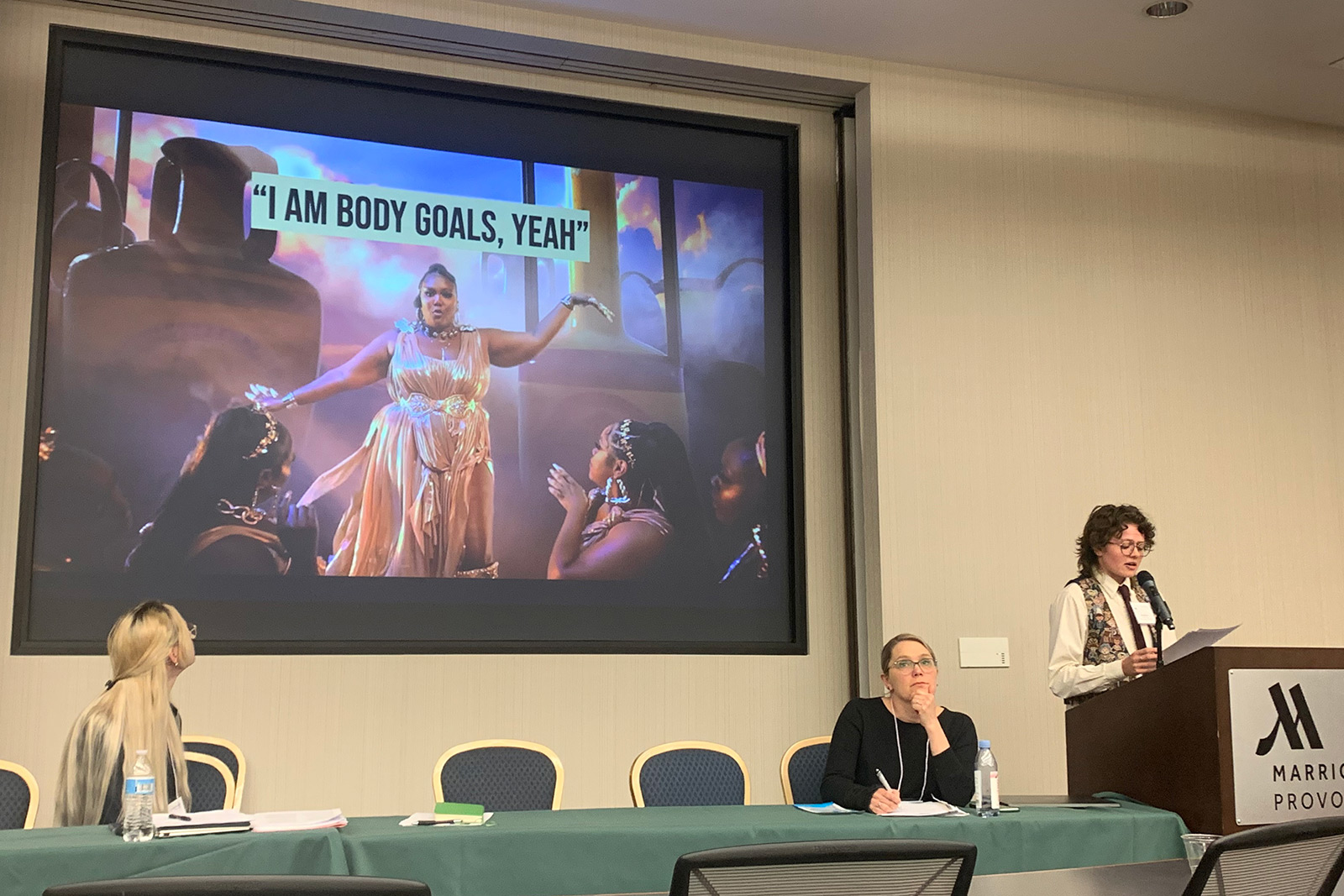When pop recording artist Lizzo donned a toga and classic Grecian headdress for her 2021 music video “Rumors,” she was making more than a fashion statement, explained Milo Rackow to a room full of scholars.
Milo, a senior ancient studies student from Fountain Hills, Arizona, was one of three Eckerd College students who presented research papers at the 119th annual meeting of The Classical Association of the Middle West and South in Provo, Utah, earlier this spring.
Each student submitted an abstract to the conference committee for consideration and was selected to travel and represent the College based on the merits of the research. Milo was joined by Maice Clanton, a senior ancient studies student from White Hall, Illinois, and Jackie Bither, a senior ancient studies student from Alameda, California.
“It is rare for undergrads to present at, or even attend, this conference—which is mostly professors and advanced Ph.D. students—so it is a big accomplishment for each of them to have been accepted,” says Visiting Assistant Professor of Classics Michael Goyette, Ph.D.
“Moreover, they each presented on topics that deal with marginalized groups in the ancient world—a topic that speaks to our program’s commitment to diversity and inclusion.”
Goyette says the four-day conference drew around 1,000 classicists from the region, and the students presented on two separate panels about women and outsiders in the ancient world.
Milo’s paper “‘All the rumors are true’: Polychromy and Representation in Lizzo’s ‘Rumors’” explains that the artist, using Greek references to the style and poses of plus-size Black women, shines a light on marginalized groups whose representation in ancient art and literature has been routinely ignored.
“I think what Lizzo has done with this music video is so important for the field,” Milo says. “There is a lack of interest in the public of classical studies in part because of a long history of scholarship that has been used to hurt marginalized people. What she has done is introducing the public to how different people view these representations through time—reception studies. She is doing very reparative work.”
The paper began as an assignment in Goyette’s Identity, Race and Ethnicity in the Ancient World course and grew into a fully researched project that Milo hopes to continue to refine for professional publication.
Maice’s paper “Women’s Economic Participation in Ancient Greece: A Re-examination through Property Records” came to her when Associate Dean for General Education and Associate Professor of Classics Heather Vincent, Ph.D., sent her an email during her summer in Israel. Maice was working with an archaeological dig team when she read that an ancient inscription discovered in Greece might indicate that a woman was a property owner—contrary to the laws that existed at the time.
“I looked at it and said, ‘Well I guess I’m doing this,’” Maice remembers with a laugh. She took up the research for her Ford Scholar research project and spent countless hours reviewing the ancient mortgage contract to ascertain what might have happened. Then it was time to present in Provo.
“It was very intimidating because one of the people I ended up getting to meet was the author of one of the sources I used in my research,” Maice says. “It was a great opportunity, especially with the ECOS [Eckerd College Organization of Students] academic conference grant to help pay for travel because a lot of humanities students don’t get the opportunity to use that resource.”
Attending the conference has bolstered Milo’s and Maice’s confidence in their paths toward graduate studies in the classics and their passion for widening the representation in the field.
“Like everyone else, I came to Eckerd for marine science,” Milo says. “When I heard that Professor Goyette was teaching a class called Women and Gender in the Ancient World, I dropped Biological Oceanography to take it. The first day in the class I thought, Oh. This is what I want to do.
“I don’t regret my decision.”














